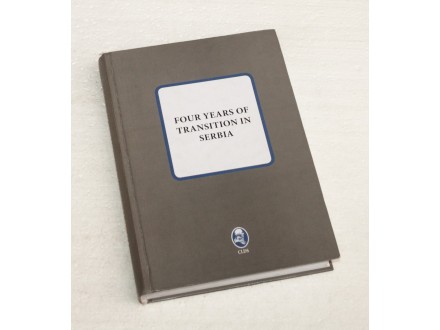Four Years of Transition in Serbia, Boris Begović
Stara cena |
500 din |
|
| Cena: | ||
| Stanje: | Polovan bez oštećenja |
| Garancija: | Ne |
| Isporuka: | Pošta Post Express Lično preuzimanje |
| Plaćanje: | Tekući račun (pre slanja) Lično |
| Grad: |
Beograd-Zemun, Beograd-Zemun |
ISBN: Ostalo
Godina izdanja: 2005
Autor: Domaći
Jezik: Engleski
Autor: Boris Begović, Milica Bisić, Milica Đilas, Boško Živković, Gordana Matković, Boško Mijatović, Marko Paunović, Danica Popović, Slobodan Samardžić, Snežana Simić, Dragor Hiber
Izdavač: Center for Liberal Democratic Studies - Belgrade, 2005.
Tvrd povez, 463 str.
Težina: 770 g
nepodvlačena
Four Years of Transition in Serbia
In October, the Serbian Center for Liberal Democratic Studies (CLDS) published a new report, which captures lessons learned from the last four years of reform in the country. Following the fall of the Milosevic regime, Serbia embarked on a comprehensive institutional restructuring program to restore political stability and jump start the economy. One of the biggest problems, as the report highlights, was absence of rule of law – economic legislation was inefficient and, moreover, there was a sizeable gap between laws on paper and the way they were applied and implemented in real life. The result of Serbia’s institutional weaknesses was a lack of predictability and confidence in the economy, which meant that financial resources weren’t channeled into the productive activities.
The report shows that four years into its “new transition,” Serbia still finds itself lagging behind many of its Eastern European and Balkan neighbors. There are various reasons that the transition did not meet the expectations:
Weak administrative capacity and political deadlocks led to the gradual instead of a much-needed rapid implementation of reforms
The rise in power of interest groups stalled many reform efforts ,while at the same time the private sector failed to become a true leader of the transition process
Weak enforcement of laws in many cases has negated successful legal reforms
Lack of an understanding of market economies and democratic institutions on the part of citizens and politicians became a real obstacle to transition
Much of this is also captured in a CIPE article by CLDS’s Vice President Boris Begovic. As Boris Tadic, President of Serbia has pointed out during the launch of the report in Belgrade:
“[Serbia] should pursue market reforms, including the introduction of the rule of law and efficient protection of private property rights, not because someone from the international community is asking us to do so, but for ourselves…”
In one thing the president is right – Serbia’s success in implementing sweeping reforms and reversing the trend of bleak economic performance will depend largely on its ability to break political deadlocks and build-up domestic commitment to reform.
161
PLAĆANJE POUZEĆEM NIJE MOGUĆE
POGLEDAJTE I OSTALE KNJIGE KOJE PRODAJEM
KLIKNITE NA LINK
https://www.kupindo.com/pretraga.php?Prodavac=madena&Grupa=1
Predmet: 59021075







